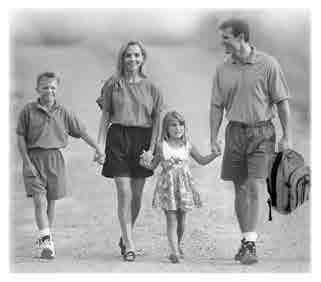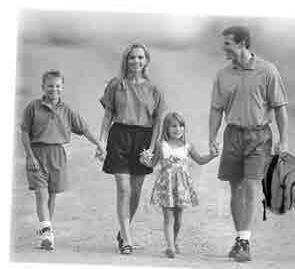
6 minute read
Look Back
L K BACK!
1 Look, read and say as in the example.
Mrs Walker couldn’t do any housework because of her broken leg. She made a list and gave it to all the members of her family at 3 o’clock in the afternoon. It is 4 o’clock now. What have her children done? What did they use to do their work?
1 Kate / to wash / with a washing machine 2 Nelly / to iron / with an iron 3 Granny / to cook / on a cooker 4 Bill / to sweep / with a broom 5 Father / to go shopping / by car 6 Grandpa / to wash up / with a dishwasher machine
Do the cleaning, washing, ironing, cooking, sweeping, shopping, washing up, Example: please. Mike / to clean/ a vacuum cleaner Mike has cleaned with the vacuum cleaner.

2 Work in pairs. Ask and answer as in the example.
What shall I do with these? Peel them fi rst and then chop them.
z peel z chop 1
4
z cut z grill grill z boil z mash 2
5
z slice z mix and oil z wash z chop 3
z slice z fry 6
80
Lessons 1-2
3 Look, choose and read.
MAKE A POTATO SALAD! 1 Peel and (chop / slice) the potatoes and onions. 2 (Bake / boil) the potatoes in a pan. 3 (Add / mix) a little butter with some mayonnaise. 4 (Pour / throw) the mixture onto the potatoes and onions.
4 a) Use ‘anything’, ‘anybody’, ‘anyone’ to rewrite the sentences.
1 There’s nobody at home. 2 There’s no one living in that house. 3 There’s nothing to do this weekend. 4 She said nothing about going to England. 5 I know nobody here.
b) Use ‘nothing’, ‘nobody’, ‘no one’ to rewrite the sentences.
1 I don’t know anybody who can help me. 2 Are you sure she didn’t say anything about it? 3 There isn’t anyone home. 4 I don’t have anything to wear. 5 There isn’t anything good on TV this evening.
5 Use ‘few’ or ‘little’ to complete the sentences.
1 We have a ... sweaters in your size, but not many. 2 Would you like a ... sandwiches to take with you? 3 There is a ... milk in the refrigerator. 4 We must help. They have ... water left and no food. 5 Very ... of her poems were published in her lifetime. 6 She has a ... close friends. 7 ... is known about her life in America. 8 I like these jeans, but they are a ... too big. 9 There are very ... places where there are no cars. 10 Do you understand? Yes, a ... .
81
6 Read and write down the explanations as in the example.
There are some things which make our everyday home life easier. They are called the electrical household appliances.
They are: toaster, microwave oven, cooker, dishwasher, freezer, refrigerator (fridge), food mixer, iron, vacuum cleaner, washing machine, sewing machine and others. What each of them is for?
Example: A vacuum cleaner is a machine that is used to clean carpets, furniture and fl oors.
Now go on.
7 a) Read, then listen to Alan, talking about his family and household chores. Find out if the following statements are true or false.
1 They always fi ght about household chores.
2 They share the chores. 3 Mum and dad don’t like animals.
4 They have a dishwasher.
Household chores? No big deal! In my family we have no problems with household chores. Every Sunday evening we have a little meeting in our kitchen. We discuss all the things that we have to do, and then we make a weekly plan. Everybody gets some tasks to do. Nobody stays out. Mum puts the list on the fridge door. We check it every night before going to bed. And that’s it. The plan works well. I have to make my bed every day but I tidy up my room once a week. I usually do it on Saturday morning. I also have to lay the table but I don’t have to clear it. My sister Vicky does it. We all look after our dog. His name is Rex. My sister and I feed

82
Lessons 1-2





the dog but mum and dad have to take it for a walk, twice a day. Mum does the cooking and ironing and dad does the hoovering1 and takes the garbage out on Tuesdays and Fridays. You know what I really hate?
Washing up. Luckily, everybody has to do it. We take turns.

b) Copy the grid. Listen again and tick ( ) the right box.
Alan Vicky Mum Dad
do the hoovering
make the bed
walk the dog clear the table
tidy up the room do the ironing wash up do the cooking lay the table take out the garbage feed the dog
1hoovering [9hUvCriN] — прибирання за допомогою пилососа
83
8 Give a two-minute talk about yourself.
Use the questions below.
zzDo you have anything in common1 with Alan’s family? zzDo you share the household chores in your family? zzWhat does everybody do in your family? Use the table on p. 83. zzHow do you get on with your parents?
9 Listen to the story and write down the recipe of the vegetable soup.
10 You are going to plan and cook a Big Dinner with your friends.
PLANNING YOUR BIG DINNER FILE FOR PROJECT
1 Work in a small group. Discuss these questions and make some notes. a) What food can you cook yourselves? b) What food are you going to cook? Don’t forget about: zzan appetizer, zza soup, zza main course, zza dessert, R zza drink. c) What ingredients will you need? d) Where will you do the cooking? e) How long will it take to cook dinner? 2 Make a poster about your meal. Write out the recipés for preparing each course. Don’t forget to note about the time. Design the ‘Menu’ for Your Big
Dinner and do some drawings. 3 Display your poster and comment on it in class. 3 Display your poster and comment on it in class.
Recipé .......................... .......................... .......................... ..........................
........... ........... ........... ........... Recipé .......................... .......................... .......................... ..........................
........... ........... ........... ........... Recipé .......................... .......................... .......................... ..........................
A MAIN COURSE ........... ........... ........... ........... Recipé .......................... .......................... .......................... ..........................
A DRINK ........... ... ... ...
Recipé .......................... .......................... .......................... ..........................
Y OU R BI GD IN NE A DESSERT ........... ........... ........... ...........
84
1have something in common (with) — мати щось спільне (з)









